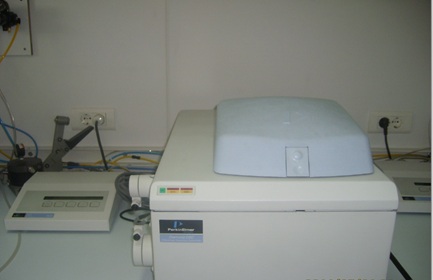Differential Scanning Calorimetry (DSC)
Instruments:
TA Instruments DSC250
Perkin Elmer Diamond Differential Scanning Calorimetry (DSC)

Accredited Methods:
- EN ISO 11357-1 TS EN ISO 11357-1 Plastics - Differential Scanning Calorimetry (DSC) Chapter 1: General Principles
- EN ISO 11357-2 TS EN ISO 11357-2 Plastics - Differential Scanning Calorimetry (DSC) Chapter 2: Glass Transition Temperature Characterization*
- EN ISO 11357-3 TS EN ISO 11357-3 Plastics - Differential Scanning Calorimetry (DSC) Chapter 3: Christallization, Melting Enthalpy, and Temperature Determination*
*: Working with accredited method between room temperature - 600ºC. The method is not used below room temperature.
Differential Scanning Calorimetry Device (DSC); It measures the amount of energy absorbed or released while the sample is heated, cooled, or kept at a constant temperature. In this technique, the temperature difference between the reference and the sample depends on temperature or time. DSC uses the same measurement principles as DTA.
Both have samples and references. Differently, in DSCs working with the power compensation principle, the sample temperature and the reference temperature are kept the same. If a temperature difference is detected between the sample and the reference, the amount of energy (power) supplied to the sample is changed to keep the temperature the same. In this way, the amount of heat transfer during the phase change in the sample can be determined.
Specifications
- Temperature range: -90 ºC to 550 ºC
- Temperature accuracy: ±0.1 ºC
- Temperature resolution: ± 0.01 ºC
- Heating rate: 0.01 ºC to 500 ºC/min.
- Calorimeter accuracy: < ± 1%
- Calorimeter resolution: < ± 0.1%
- Calorimeter sensitivity: 0.2m W
Sample Requirements
Minimum 10 mg of the solid amount required.
Applications
- Glass transition temperature
- Melting, crystallization temperatures, and enthalpy determination
Laboratories
Laboratories
Instruments:
TA Instruments DSC250
Perkin Elmer Diamond Differential Scanning Calorimetry (DSC)

Accredited Methods:
- EN ISO 11357-1 TS EN ISO 11357-1 Plastics - Differential Scanning Calorimetry (DSC) Chapter 1: General Principles
- EN ISO 11357-2 TS EN ISO 11357-2 Plastics - Differential Scanning Calorimetry (DSC) Chapter 2: Glass Transition Temperature Characterization*
- EN ISO 11357-3 TS EN ISO 11357-3 Plastics - Differential Scanning Calorimetry (DSC) Chapter 3: Christallization, Melting Enthalpy, and Temperature Determination*
*: Working with accredited method between room temperature - 600ºC. The method is not used below room temperature.
Differential Scanning Calorimetry Device (DSC); It measures the amount of energy absorbed or released while the sample is heated, cooled, or kept at a constant temperature. In this technique, the temperature difference between the reference and the sample depends on temperature or time. DSC uses the same measurement principles as DTA.
Both have samples and references. Differently, in DSCs working with the power compensation principle, the sample temperature and the reference temperature are kept the same. If a temperature difference is detected between the sample and the reference, the amount of energy (power) supplied to the sample is changed to keep the temperature the same. In this way, the amount of heat transfer during the phase change in the sample can be determined.
Specifications
- Temperature range: -90 ºC to 550 ºC
- Temperature accuracy: ±0.1 ºC
- Temperature resolution: ± 0.01 ºC
- Heating rate: 0.01 ºC to 500 ºC/min.
- Calorimeter accuracy: < ± 1%
- Calorimeter resolution: < ± 0.1%
- Calorimeter sensitivity: 0.2m W
Sample Requirements
Minimum 10 mg of the solid amount required.
Applications
- Glass transition temperature
- Melting, crystallization temperatures, and enthalpy determination
